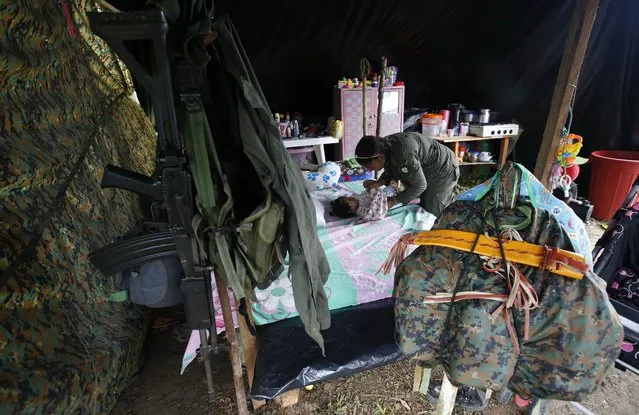
In this Tuesday, February 28, 2017 photo, FARC rebel Sandra Saez changes her 4-month-old daughter Manuela inside her tent at a rebel camp in a demobilization zone in La Carmelita, in Colombia's southwestern Putumayo state. In La Carmelita, one of the more built-up camps, rebels sleep under plastic tarps, there are no proper showers or clinics and a road to the main highway is so muddy it is hard to traverse except in all-terrain vehicles. (Photo by Fernando Vergara/AP Photo)
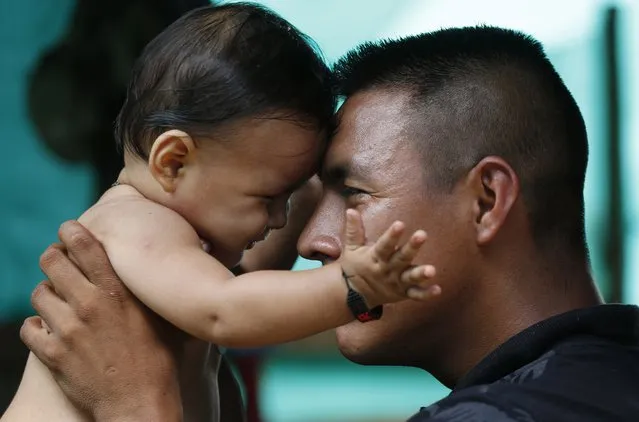
In this Tuesday, February 28, 2017 photo, FARC rebel Vicente Pulecio plays with his 9-month-old son Dainer inside their tent at a rebel camp in a demobilization zone in La Carmelita, in Colombia's southwestern Putumayo state. Pulecio's wife Jerly Suarez gave birth to their son shortly before the FARC began its march to one of the 26 demobilization zones. (Photo by Fernando Vergara/AP Photo)
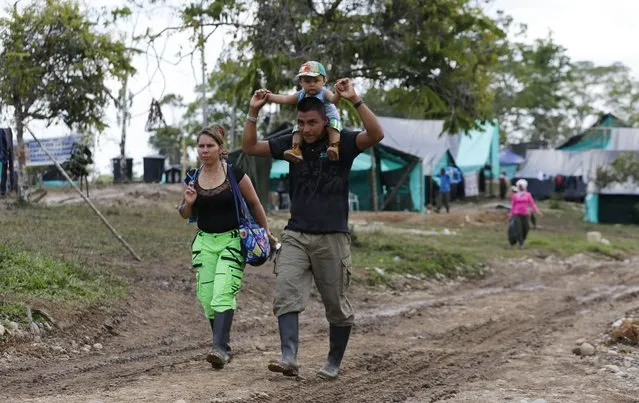
In this Tuesday, February 28, 2017 photo, FARC rebel couple Jerly Suarez, left, and Vicente Pulecio walk to a cooking class with their 9-month-old son Dainer at a rebel camp in a demobilization zone in La Carmelita, in Colombia's southwestern Putumayo state. “It wasn't seen as viable for us to have children, because why is someone going to have them when there are bullets flying around?” said Suarez, referring to the loosening of rules on baring children after the rebel group and the government reached an agreement to end their armed conflict. (Photo by Fernando Vergara/AP Photo)
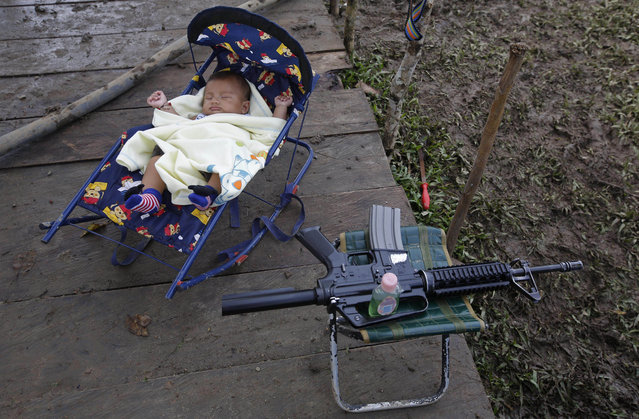
In this Tuesday, February 28, 2017 photo, 3-month-old Junior Alexis Patino, son of FARC rebel Deisy Garcia, sleeps next to his mother's weapon at a rebel camp in a demobilization zone in La Carmelita, in Colombia's southwestern Putumayo state. Amid the makeshift tents and communal kitchens where Colombia's largest rebel army is preparing to lay down its weapons, a new sound is emerging: the cries of babies. (Photo by Fernando Vergara/AP Photo)
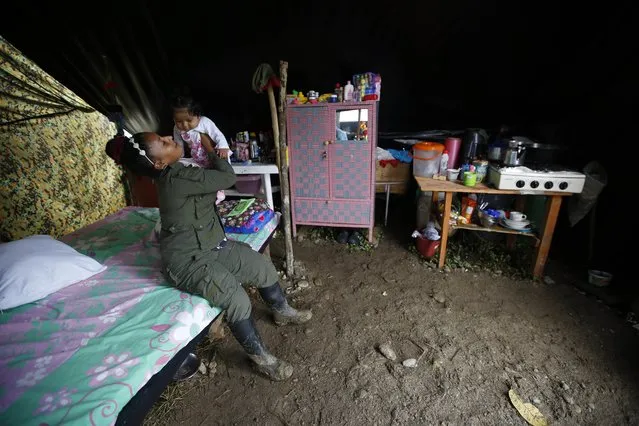
In this Tuesday, February 28, 2017 photo, FARC rebel Sandra Saez plays with her 4-month-old daughter Manuela inside their tent at a rebel camp in a demobilization zone in La Carmelita, in Colombia's southwestern Putumayo state. The birth of babies at rebel camps and the arrival of older children who had been left with relatives during the conflict has injected a sense of optimism into camps where war-hardened rebels are beginning their transition to civilian life. (Photo by Fernando Vergara/AP Photo)
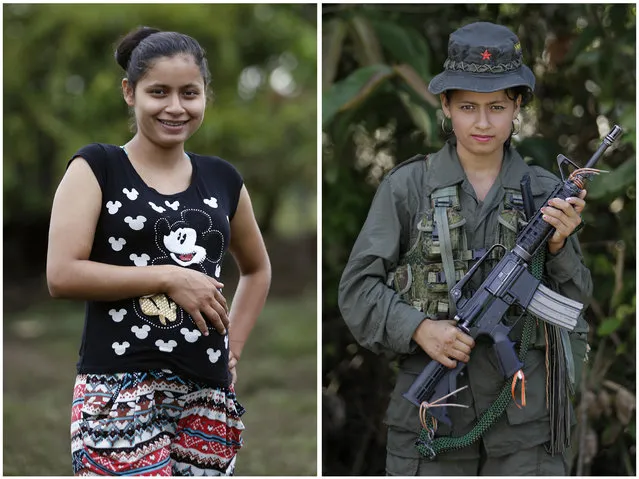
This combo of two photos of FARC rebel Mayerly Munoz shows her 32-weeks pregnant on February 28, 2017 at a FARC camp inside a demobilization zone in La Carmelita in Colombia's Putumayo state, left, next to a photo of her taken last year on Aug. 16, 2016 at a jungle camp in the same area. Among the 7,000 guerrillas gathered at the demobilization zones across the country, 114 women are pregnant and 77 babies have been born recently, according to the government. (Photo by Fernando Vergara/AP Photo)
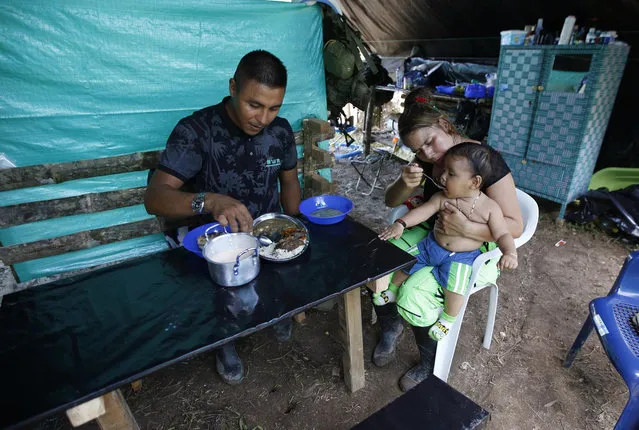
In this Tuesday, February 28, 2017, rebel couple Jerly Suarez, right, and Vicente Pulecio eat lunch with their 9-month-old son Dainer inside their rebel camp tent within a demobilization zone in La Carmelita in Colombia's southwestern Putumayo state. As the guerrilla army is preparing to lay down its weapons, a rebel baby boom has struck a chord among urban Colombians far removed from the conflict, a few of whom have mobilized to transport diapers and creams to the new mothers after seeing images of sweltering infants on cots in the rural encampments. (Photo by Fernando Vergara/AP Photo)
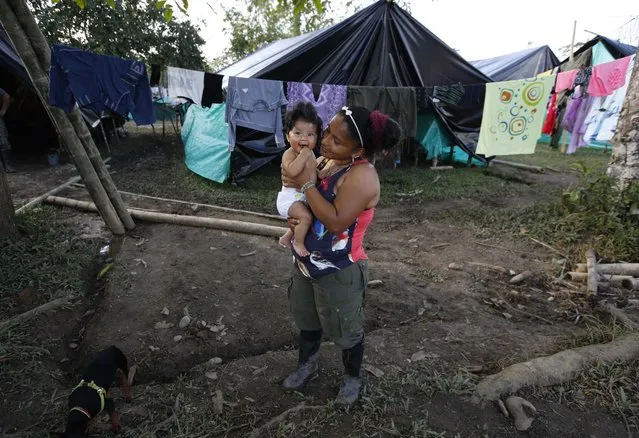
In this Tuesday, February 28, 2017 photo, FARC rebel Sandra Saez holds her 4-month-old daughter Manuela outside her tent at a rebel camp in a demobilization zone in La Carmelita, in Colombia's southwestern Putumayo state. Maternity was always a hot topic of discussion within the rebel ranks, and the practice of forbidding female fighters from keeping their children at the camps flew in the face of the rebels’ claim that by enrolling female warriors they were freeing women from traditional gender roles that restricted women’s choices, and it angered many in this devoutly Roman Catholic country. (Photo by Fernando Vergara/AP Photo)
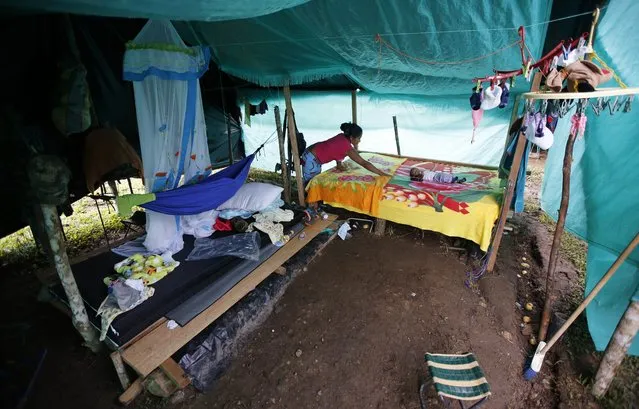
In this Tuesday, February 28, 2017 photo, FARC rebel Deisy Garcia makes her bed where her 3-month-old son Junior Alexis rests inside their tent at a rebel camp in a demobilization zone in La Carmelita, in Colombia's southwestern Putumayo state. The FARC kept strict control over its fighters' reproductive rights and female guerrillas who became pregnant were forced to leave newborns with relatives or abort. But after the FARC and government reached an agreement to end the armed conflict, those rules loosened, resulting in a baby boom. (Photo by Fernando Vergara/AP Photo)
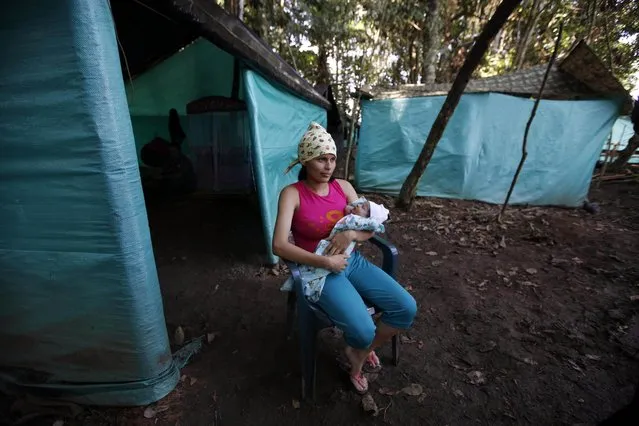
In this Tuesday, February 28, 2017 photo, FARC rebel Marly Velasquez holds her 18-day-old-daughter Andry Talia during an interview outside her tent at a demobilization zone in La Carmelita in the Colombia's southwestern state of Putumayo. During times of war, constant confrontation with army soldiers and guard duties in jungle camps made raising children during the conflict difficult, if not impossible. Women were given steady supplies of contraceptives, and those who did get pregnant were presented with two options: leave the baby with the family members or end the pregnancy. (Photo by Fernando Vergara/AP Photo)
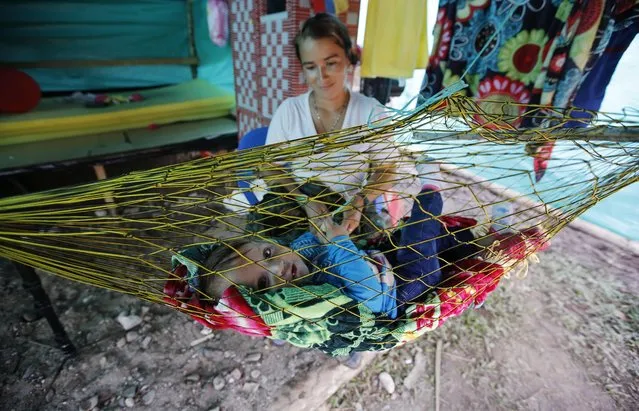
In this Tuesday, February 28, 2017 photo, FARC rebel Nelcy Rios cares for her 9-month-old daughter Naiha Sofia inside her tent at a rebel camp in a demobilization zone in La Carmelita, in Colombia's southwestern Putumayo state. Some of the guerrilla mothers are giving birth in camps, but most at nearby hospitals. Many in Colombia are referring to the babies as the “children of peace”. (Photo by Fernando Vergara/AP Photo)
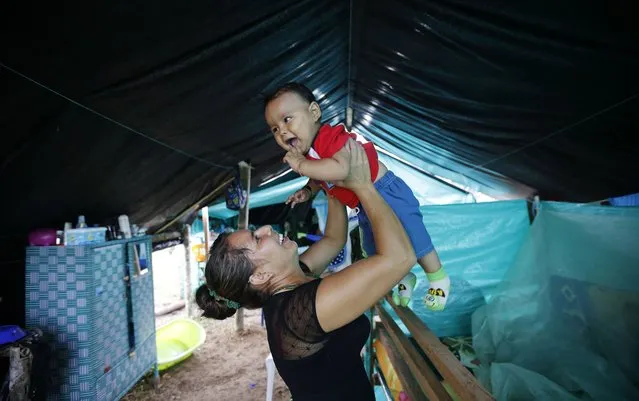
In this Tuesday, February 28, 2017 photo, FARC rebel Jerly Suarez holds up her 9-month-old son Dainer inside her tent at a rebel camp in a demobilization zone in La Carmelita, in Colombia's southwestern Putumayo state. In La Carmelita, where 500 guerrillas are expected to turn over their weapons by June 1, women speak of both the arduous conditions in which they have begun their new lives as mothers and their hopes for raising children in a time of peace. (Photo by Fernando Vergara/AP Photo)
09 Mar 2017 00:04:00,
post received
0 comments
